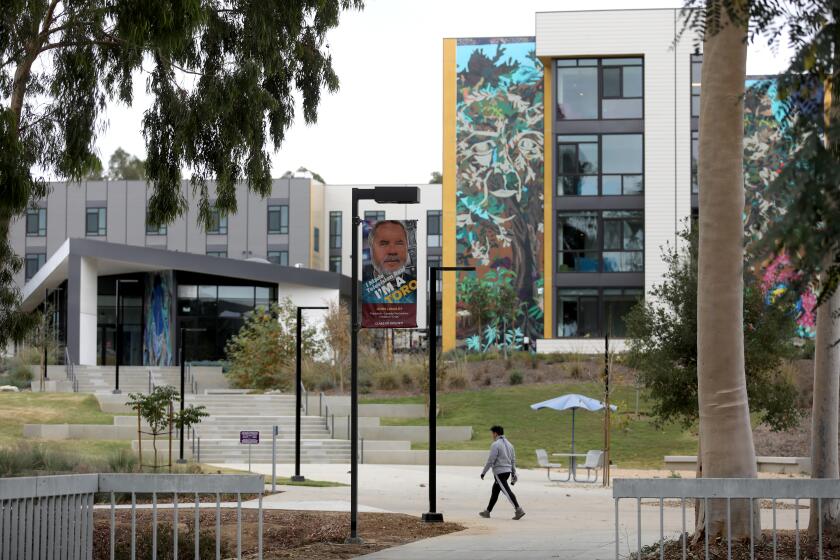Op-Ed: Rampant online cheating is the dark side of remote learning

- Share via
Since there seems to be an app for everything, it may come as no surprise that there is an app for cheating. But it isn’t just one app. It’s hundreds of companies and apps that actually can be used to complete students’ homework, tests, writing assignments and even dissertations and exams.
But what surprised me most as an educator playing this cat-and-mouse game for decades is that cheating is now scaled and outsourced internationally and powered by venture capitalists, Wall Street investors and billion-dollar companies. One of the biggest companies whose services enable students to cheat, Chegg, is facing a lawsuit filed in September by major textbook company Pearson.
Companies such as Chegg and Course Hero offer monthly subscription formats — similar to Netflix — in which students pay $10 or $15 a month for round-the-clock access to resources including exam questions, textbook solutions and homework “help,” meaning that subscribers can upload a problem to their accounts and expect answers with proof within minutes or the hour. They also get on-demand access to many experts, often based overseas (Chegg employs more than 70,000 experts in India), with advanced degrees in math, science, engineering, technology, business, economics and other subjects. These experts, available online 24/7, are the source of step-by-step answers.
Companies such as Grade Bees and EduBirdie will even write your five-page reflective paper or 25-page essay, as original work, for varied prices. English-speaking writers from around the world are for hire, in some cases within days or even hours. Some sites and guides let the student know that their relationship will be closely guarded, and no, the student’s professor should not be able to find out, at least not under the right precautions.
Cheating is so rampant that Stanford University’s Graduate Student Council recently announced it had approved revisions to its academic honor code to allow test proctoring. If the changes go through, they will represent the first revision to the code since 1977, according to the student newspaper. Reported honor code violations there went up 114% in the last two years.
Multiple news stories have chronicled widespread cheating in colleges and universities, particularly in the STEM fields. This year, stories in Forbes, the Wall Street Journal and U.K. publications including Education Technology have spotlighted the growth and profits of public companies such as Chegg.
Chegg reported 4.9 million subscribers as of the end of June, a 31% year-over-year increase, and $198.5 million in quarterly revenue, also a 30% year-over-year increase. Among its many services is a way for cheaters to leap over the hurdle of problem-solving questions, in which students are asked to show how they got their answers. Chegg’s experts on demand can personally answer the subscriber’s unique test or homework question.
COVID-19 forced schools to shift to online learning. At CSU, it’s sticking around in what will be a new normal.
As an unintended consequence of technology allowing remote learning and exams, students are finding more and more online venues allowing them to earn grades and diplomas by cheating.
How do we curb this global supply chain of cheating and its threat to the integrity of our students and educational systems?
The answer depends on the motivation behind the decision to cheat. Some students don’t think of it as cheating, as they are paying a legit company for the service; many feel pressured to get the grades and so justify the means. Other students may use these services to make up for the learning lost when in-person teaching was halted during the pandemic.
Many students who are cheating dodge academic consequences, as there are few technology solutions to capture original answers provided by experts, and plagiarism-catching software can’t detect original work bought and paid for by these students.
However, in 2020, Australian lawmakers made it illegal to arrange or advertise for sale certain cheating services such as paid essay writing. Did it have an effect? According to Forbes contributing writer Derek Newton, many of the biggest and best-known essay mills are ending operations there. But even then, fear of getting caught is probably not enough motivation to stop all cheating students.
Another action that should be aimed at contract cheating companies is getting Visa and PayPal to stop acting as payment intermediaries for them. And professors and their universities could join the Pearson lawsuit, though that may be a step too far for most risk-averse institutions of higher education.
Countering this cheating requires a coordinated effort by educational institutions and their accreditors, with accreditation agencies possibly changing online professional entrance exams to prevent cheating. Fields such as engineering, science and nursing will lose in the long run if newly minted students cheat their way into the professions.
Indeed, our society loses the most from this cheating in plain sight. Cheating corrupts the individual who cheats, yes, but it also erodes the faith we have in our educational system, its honest graduates and the people we depend on to build tech that truly serves human interaction, decision making and achievement.
Karen Symms Gallagher is a professor of education and the Veronica and David Hagen chair in women’s leadership at USC. As dean of the USC Rossier School of Education, she was an early adopter a decade ago of online education for master’s degrees.
More to Read
A cure for the common opinion
Get thought-provoking perspectives with our weekly newsletter.
You may occasionally receive promotional content from the Los Angeles Times.











